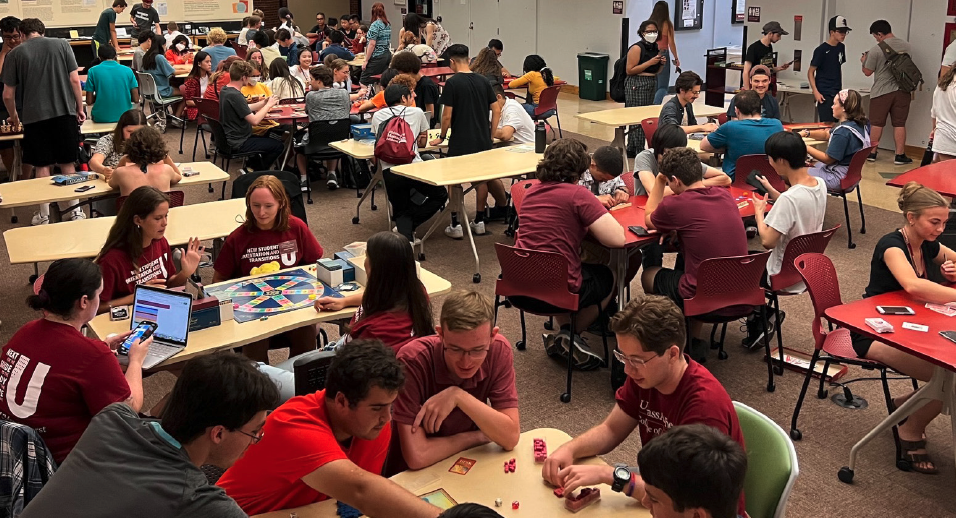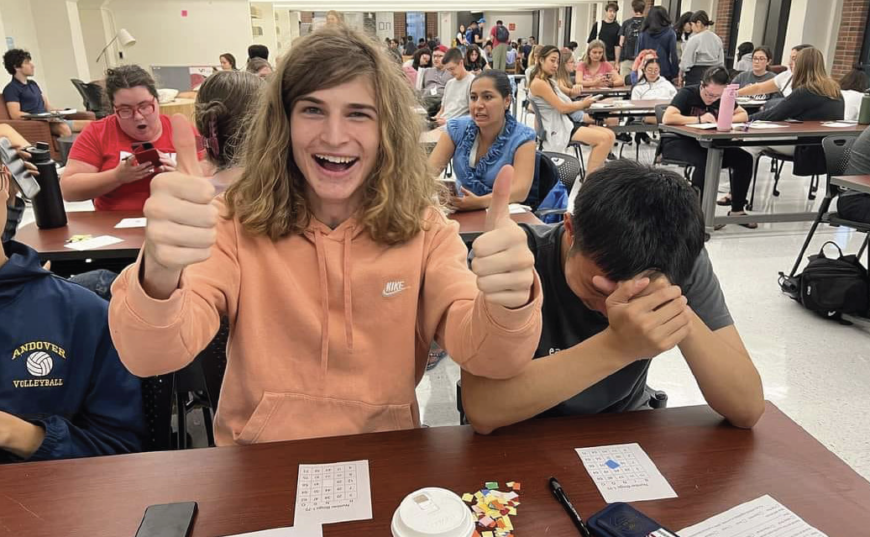
A Place for ALL: The Libraries’ critical role in supporting student success
by Madeline Zelazo ’22
The Libraries’ former map room is now a destination in its own right.
With the removal of oversized maps and books from half a floor in the W. E. B. Du Bois Library, the space is opened up and outfitted with movable furniture that glides easily to support casual groupings and impromptu project spaces. Existing shelving holds board games, puzzles, and an assortment of craft materials, free for students to use and share. Whiteboards bookend the entryway with information about the space, trivia questions, and little doodles left by anonymous visitors.
One corner of the room filled with comfy seats sports the EconoLodge logo; the motel was an overflow housing respite for students early in the fall term—a space of their own, on campus. The north end of the room is used as a staging area for the weekly Libraries Outreach Series events, ranging from bingo and board games to arts and crafts and open mic nights.
In a nod to the floor’s former role, a world map hangs opposite the entryway, inviting those who stop by to pin their hometown on the map. The space, currently referred to as “RECESS” (Recharge, Engage, Connect, Energize, Support, and Succeed) until students name it via a contest, is designed to be welcoming to everyone and foster a sense of belonging.
What does any of this have to do with the business of being an academic library?
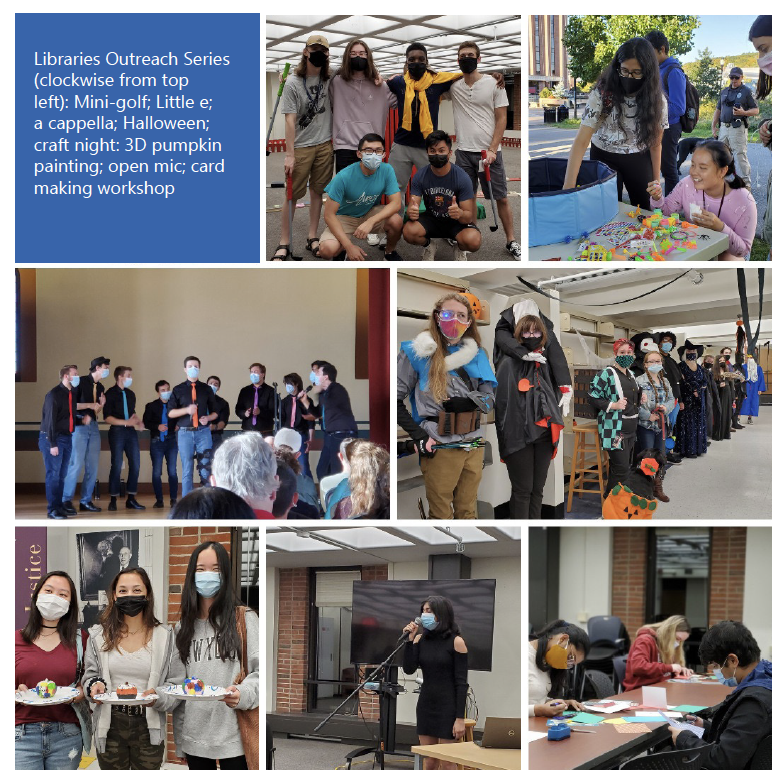
Of the more than 300 Libraries Outreach Series attendees surveyed to date, every student respondent has indicated these activities helped with a combination of well-being, making connections, relaxing, and recharging. Many commented that they appreciated: “being able to wind down and take my mind off things”; “meeting new people, the chill environment”; and “[relaxing] with friends in a space big enough for all of us.”
More than 90 percent of students surveyed said they would be more likely to use library services and resources after attending a Libraries Outreach Series event.
“Creating spaces where students feel they belong is a critical component of supporting student success,” says Dean of Libraries Nandita S. Mani, PhD. “Feeling like they belong helps students make connections, which directly supports their mental health and their academic journey.”
“Learning to live well and attend to one’s mental health are skills college students can and should develop during this time, and academic libraries are increasingly playing a role in this part of the student experience,” extolled editors Sara Holder and Amber Lannon in their 2020 book Student Wellness and Academic Libraries: Case Studies and Activities for Promoting Health and Success, published by the Association of Colleges and Research Libraries (ACRL).
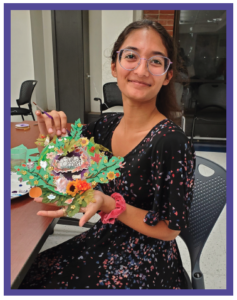
College students’ sense of belonging continues to be an important predictor of mental health. That’s why Dean Mani hit the ground running in her first few weeks, working with campus leaders to support and grow a sense of belonging across campus.
During fall 2021, the Office of Equity and Inclusion (OEI) kicked off Belonging@UMass, a series of educational and inspiring talks, panels, and workshops for students, staff, and faculty, to learn about equity, inclusion, and belonging for all.
“Belonging@UMass grew out of a desire to create a strong, unified sense of community while improving the experience of campus groups that feel a lower average sense of belonging,” says Nefertiti Walker, vice chancellor and chief diversity officer.
Along with courses, housing assignments, and financial burden, today’s college students are exposed to stressors that can stretch far beyond the expected strain of staying on top of studies. Students can become overwhelmed by a culture of erratic sleep schedules and eating habits, emerging financial independence (and its associated pitfalls), and taxing social relationships, all while under the pressure of supposedly living the best years of their lives. The coronavirus pandemic exacerbated those conditions.
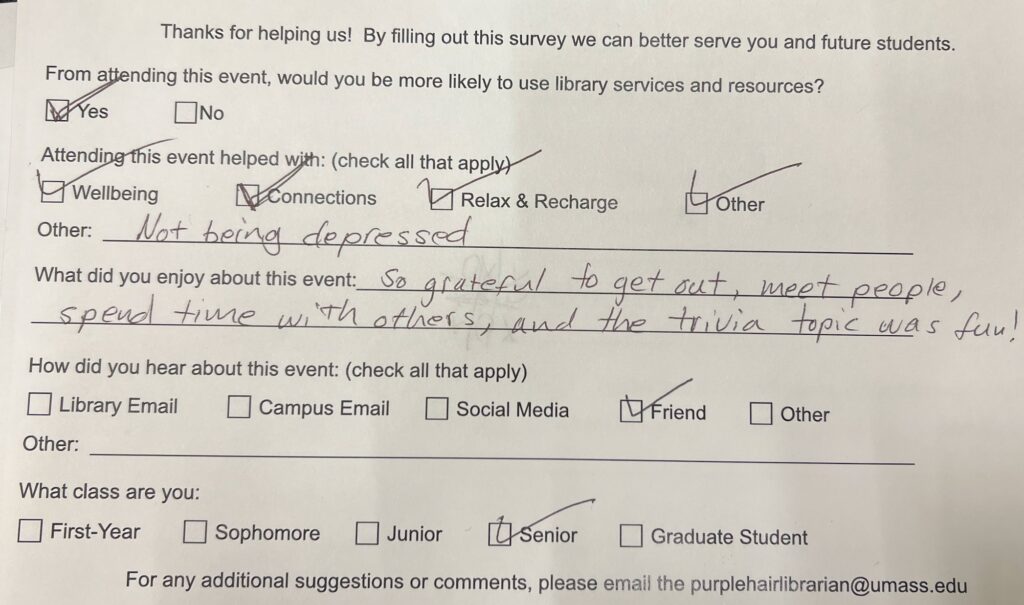
Universities have been in the trenches of a mental health crisis for at least the last decade. In 2019, experts began releasing data that displayed thoroughly for the first time that college students were struggling in record numbers with mental health crises, and that universities and colleges were working to expand resources to keep them afloat. In order to be effective, attention to well-being needs to pervade all aspects of campus culture.
In line with educational institutions’ emphasis on student well-being, many academic libraries, like the UMass Amherst Libraries, have been creating their own wellness initiatives. Libraries’ growing involvement in supporting well-being on campuses has been identified as one of the 2020 top trends in academic libraries by the ACRL.
The emerging interest in developing library services, programs, and spaces that facilitate student wellness is an example of a social turn in library innovation, or a shift from collection-based to community-oriented service models. In this new framework, libraries take a holistic approach to the student experience, actively seeking partners and collaborators within and beyond the institution.
As educators and advocates, serving students must be at the center of the campus’s work, says Pearson, director of New Student Orientation and Transitions. “The creation of this space is a testament to putting students first. The Libraries should be a liberating, inclusive environment where students can feel intimately connected and cared for, and that is what the creation of RECESS has done. Many incoming students have a limited perspective of what a library can provide,
Spaces for student wellness embedded in places where intellectual wellness is already supported on campus provide the best opportunities for students seeking assistance.
“Student success, student well-being, and student belonging must be integrated, collaborative work from our entire campus,” says Pearson. “The Libraries’ creation of RECESS demonstrates their commitment to student success, and to listening to the campus and institutional student needs.”

The Libraries have long been focused on welcoming all students, including finding creative ways to bring them through the doors. Before the pandemic, the Libraries offered Finals Fun with snacks and arts and crafts to de-stress and partnered with peer health educators on campus to provide canine cuddles twice a semester with Bright Spot Therapy Dogs.
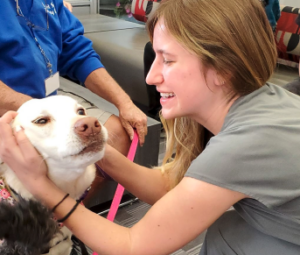 During remote learning, connecting with students became even more important. After working together on a successful fundraiser for the Student Care and Emergency Response Fund, Annette Vadnais, student success and outreach librarian (also known as the Purple Hair Librarian), and Lauren Weiss, associate editor of digital content, hosted the Libraries’ first virtual Get Your Game On board game night. More than 70 students logged in on Zoom and spent almost two hours playing bingo, Pictionary, Scattergories, and trivia. As the event wrapped up, a number of attendees asked for more events like it.
During remote learning, connecting with students became even more important. After working together on a successful fundraiser for the Student Care and Emergency Response Fund, Annette Vadnais, student success and outreach librarian (also known as the Purple Hair Librarian), and Lauren Weiss, associate editor of digital content, hosted the Libraries’ first virtual Get Your Game On board game night. More than 70 students logged in on Zoom and spent almost two hours playing bingo, Pictionary, Scattergories, and trivia. As the event wrapped up, a number of attendees asked for more events like it.
With students craving opportunities for connection, and the Libraries being an interdisciplinary unit that serves all, Vadnais and Weiss built out a bimonthly virtual game night series for the rest of the semester.
The runaway success of those events led to the development of the Libraries Outreach Series during spring 2021, which, in addition to game nights, offered weekly activities such as yoga, virtual concerts, an open mic night, and online visits with the therapy dogs. For the 2021–2022 school year, the Outreach Series moved to in-person, which allowed for even more types of events, including arts and crafts activities and an improv workshop.
Equipped with survey data proving the impact of the Libraries’ focus on well-being, Vadnais and Weiss proposed converting the unused map room on Floor 2 in the Du Bois Library into a study break space with games, crafts, and opportunities for connection as well as a central location for the Libraries Outreach Series.